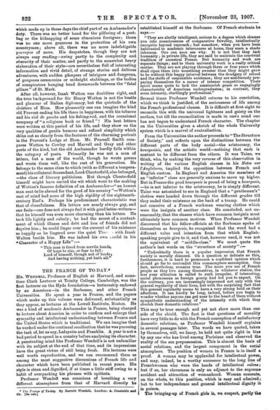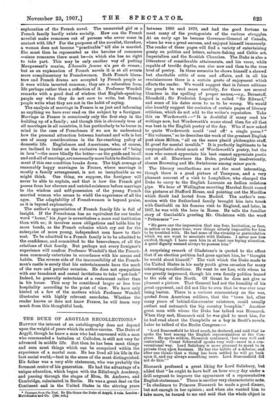THE FRANCE OF TO-DAY.*
Mn. WENDELL, Professor of English at Harvard, and some- time Clark Lecturer at Trinity College, Cambridge, was the first lecturer on the Hyde foundation—a lectureship endowed by an American—in the Sorbonne, and other French Universities. He spent a year in France, and the papers which make up this volume were delivered, substantially as they appear, as lectures at the Lowell Institute, Boston. He was a kind of academic Ambassador in France, being charged to lecture about America in order to confirm and enlarge that sympathy and intellectual understanding between France and the United States which is traditional. We can imagine that be worked under the continual recollection that he was pursuing the task of, let us say, Lafayette and Franklin. A year is not a bad period to spend in a country before analysing its character. A penetrating mind like Professor Wendell's is not unfamiliar with its subject at the end of that time, and its impressions have the great virtue of still being fresh. His lectures were well worth reproduction, and we can recommend them as among the most suggestive discussions of French life and character which have been published in recent years. His style is clean and dignified, if at times a little stiff owing to a habit of overpacking his phrases with epithets.
Professor Wendell was conscious of breathing a very different atmosphere from that of Harvard directly he
Ths Francs of To-day. By Barrett Wendell. London: A. Constable and Co. [Si. net.]
established himself at the Sorbonne. Of French students he says :—
" They are alertly intelligent, serious to a degree which shames you into consciousness of comparative frivolity, intellectually energetic beyond reproach ; but somehow, when you have been habituated to academic intercourse at home, they seem a shade inhuman. One can soon see why. It is not that they lack humanity ; in private life, they are said to maintain the convivial tradition of ancestral France. Bnt humanity and work are separate things ; and to them university work is a really critical matter. They are not playing through three or four years which shall ripen them into something sweeter than they might grow to bo without this happy interval between the drudgery of school and the strife of responsible existence ; they are assiduously pre- paring themselves for a career of intense competition. Their spirit seems quite to lack the amateurish grace so engagingly characteristic of American undergraduates ; in contrast, they seem intensely, startlingly professional."
Several times Professor Wendell returns to his conviction, which we think is justified, of the seriousness of life among
the French professional classes. It is difficult at first sight to reconcile this with the universal lightness and gaiety on the surface, but till the reconciliation is made in one's mind one has not begun to understand French character. The chapter on the Universities gives a sketch of the whole University system which is a marvel of centralisation.
From the Universities the author proceeds to " The Structure of Society," and reflects upon the distinctions between the different parts of the body social—the aristocracy, the
bourgeoisie, and the artistic world—noticing that each is content to be different from the others. It was Taine, we think, who, by making the very reverse of this observation in writing of the various English classes in his Notes sur l'Angleterre, implied the opposition between French and English custom. In England and America the members of an " inferior " class are generally anxious to move up higher. But in France the good bourgeois is proud of being a bourgeois, —he is not inferior to the aristocracy, he is simply different. Taine was astonished to see in England that a "gentleman's" clothes were handed down through the different grades till they ended their existence on the back of a tramp. He could not conceive of a French workman wearing clothes which were the insignia of another class. He concluded, not un- reasonably, that the classes which have common insignia must
ultimately have common motives. When Professor Wendell discovered that his fellow-officials at the Sorbonne spoke of
themselves as bourgeois, he recognised that the word had a different value and intention from that which English-
speaking people give to it, and that, however used, it was not the equivalent of " middle-class." We must quote the author's last words on the "structure of society " :—
" Undoubtedly there is a popular impression that French society is morally diseased. On a question so delicate as this, furthermore, it is hard to pronounce a confident opinion which should go far to contradict this commonplace assumption. One fact, nevertheless, remains true. The more you see of French people as they live among themselves, in whatever station, the less your attention is called to such irregular, if interesting, social phenomena as foreign gossip had led you to expect. On the contrary, you are increasingly impressed not only with the general regularity of their lives, but with the surprising fact that this general regularity seems to have a very strong hold on their affections. It can hardly be long, indeed, before you begin to wonder whether anyone can get near to the heart of them without sympathetic understanding of the intensity with which they cherish their domestic relations."
This may be true enough and yet not show more than one side of the shield. The fact is that questions of morality have very little to do with the French conception of satisfactory domestic relations, as Professor Wendell himself explains in several passages later. The words we have quoted, taken by themselves, will, we fancy, be held not quite right in bias by any one who has lived among Parisians and observed the
reality of the sex prepossession. This is almost the basis of social relations, and the largest component in the social atmosphere. The position of women in France is in itself a proof. A woman may be applauded for intellectual power, and may, indeed, be a worthy successor to the long line of Frenchwomen who were the heads of intellectual salons ; but if so, her cleverness is only an adjunct to the supreme accident and attraction of womanhood. Woman consents, on the whole, to this position, which is easy and admired; but to her independence and general intellectual dignity it is poison.
The bringing-up of French girls is, we- suspect, partly the
explanation of the French novel. The unmarried girl in a French family hardly exists socially. How can the French novelist make romances out of persons who never come in contact with life P For the purposes of the novelist, therefore, a woman does not become "practicable" till she is married. She must then be represented as the heroine of romances —since romances there must be—in which she has no right to take part. This may be only another way of putting Maupassant's maxim, Phonate femme n'a pas de roman; but as an explanation of Frenoh novels it is at all events more complimentary to Frenchwomen. Both French litera- ture and French drama are accepted by French people as it were within inverted commas ; they are a relaxation from life perhaps rather than a reflection of it. Professor Wendell remarks with a good deal of wisdom that English-speaking people say what they do not . care to write, but French people write what they are not in the habit of saying.
The analysis of marriage in France is as just and informing as anything we have ever read on the subject by a foreigner. Marriage in France is consciously only the first step in the building up of a family; and though this is obviously true of all marriages in all countries, it has particularly to be borne in mind in the case of Frenchmen if we are to understand how the personal attraction between husband and wife is but one of many considerations in the far-reaching policy of domestic life. Englishmen and Americans, who, of course, are inclined to insist on the exclusive importance of " being in love"—the more blindly the better—as the guide and be-all and end-all of marriage, are necessarily more liable to disillusion- ment if this one condition breaks down. The high average of reasonably happy marriages in France, where marriage is mostly a family arrangement, is not so inexplicable as we might think. One thing, we suppose, the foreigner will never be able to explain, and that is bow the French girl passes from her obscure and untried existence before marriage to the wisdom and self-possession of the young French married woman who seems to wield the experience of all the ages. The adaptability of Frenchwomen is beyond praise, as it is beyond explanation.
The author's appreciation of French family life is full of insight. If the Frenchman has no equivalent for our tender word "home," his foyer is nevertheless a more real institution than with us; it involves more obligations and holds him by more bonds, as the French colonies which cry out for the enterprise of more young, independent men know to their cost. To be admitted to a French family is to be admitted to the confidence, and committed to the benevolence, of all the relations of that family. But perhaps not every foreigner's experience will confirm Professor Wendell's that the French- man commonly entertains in accordance with his means and habits. The reverse side of the inaccessibility of the French- man's castle is surely that his entertainments have the mark of the rare and peculiar occasion. He does not sympathise with our broadcast and casual invitations to take " pot-luck." Indeed, he generally entertains at a restaurant rather than in his house. This may be considered larger or less true hospitality according to the point of view. We have only hinted at a few of the matters which Professor Wendell illustrates with highly relevant anecdotes. Whether the reader knows or does not know France, he will learn very much from this thoughtful book.



















































 Previous page
Previous page